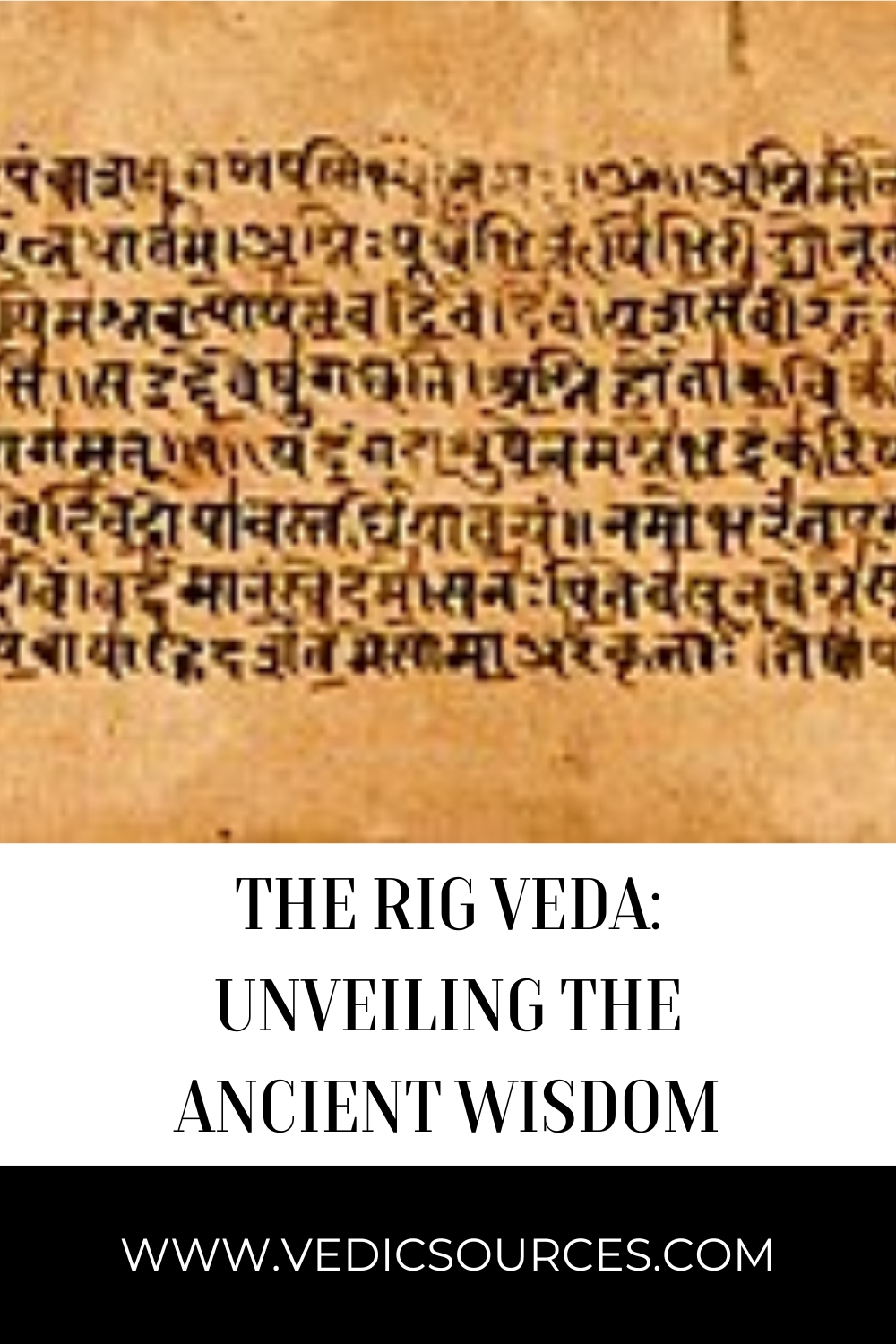The Rig Veda is one of the oldest texts in human history. Stands as a profound testament to the wisdom and spirituality of ancient India. Composed in Sanskrit, it forms the foundation of Hindu philosophy. And serves as a treasure trove of knowledge on various aspects of life, spirituality, and cosmic order. This blog post delves into the depths of the first Veda, unraveling its essence, and exploring its origin, authors, age, and the hymns that make it a timeless masterpiece.
What is the Rig Veda?
The Rig Veda is an ancient Indian text that belongs to the Vedic period, dating back to approximately 1500-1200 BCE. It is a collection of sacred hymns composed in Vedic Sanskrit, a language that was prevalent during that era. The Rig Veda is part of the four Vedas, which are the fundamental scriptures of Hinduism, collectively known as the Vedic literature. This Veda, with its 1,028 hymns, is the oldest and most significant Veda, serving as the foundation for subsequent Vedic texts.
Who Wrote the Rig Veda?
The Rig Veda does not have a single identifiable author. Instead, it represents the collective wisdom of ancient India’s several sages, seers, and rishis. These enlightened souls, known as the rishis, were deeply connected with the cosmic consciousness and were instrumental in receiving divine revelations and insights. The hymns of the rich Veda were revealed to them through a state of profound meditation and spiritual experiences. The most notable rishis associated with this Veda include Vishvamitra, Vasishtha, Agastya, and Atri.
How Old is the Rig Veda?
This Veda is estimated to be over 3,500 years old. Making it one of the oldest known texts in the world. Scholars and historians have meticulously studied linguistic, cultural, and astronomical references within the Rig Veda to determine its approximate age. These studies, combined with archaeological evidence. Place the composition of the Rig Veda in the second millennium BCE. Its age signifies the ancient roots of Hinduism and the deep spiritual heritage of India.
Rig Veda Hymns
Get a glimpse into divine wisdom with the Rig Veda’s hymns, renowned for their poetic beauty, intricate symbolism, and profound spiritual insights. They cover a wide range of topics, including cosmology, creation myths, nature worship, rituals, prayers, and philosophical contemplations. The hymns are addressed to various deities such as Agni (the god of fire), Indra (the god of thunder and rain), Varuna (the god of cosmic order), and many others.
Composed in specific meters, each hymn of the Rig Veda intends to evoke spiritual contemplation, praise, and divine connection.
Here are a few famous hymns from the Rig Veda:
- Hymn to Agni (Rig Veda 1.1) ॐ अग्निं ईडे पुरोहितं यज्ञस्य देवं रत्वीजम्। होतारं रत्नधातमम्॥ Agniṁ īḷe purohitaṁ yajñasya devaṁ ṛtvījam Hotāraṁ ratnadhātamam
“O Agni, the God of Fire, we invoke you, The divine messenger between humans and gods. You bring us blessings and fulfill our desires, Illuminate our path, and lead us to prosperity.”
- Hymn to Indra (Rig Veda 2.12) ॐ इन्द्रस्य त्वा वज्रिणम् वज्रिणम् अग्ने पुर विदामसि। त्वम् अस्मिन् विश्वे अद्भुते॥ Indrasya tvā vajriṇam vajriṇam agne pura vidāmasi Tvam asmin viśve adbhute
“Indra, the mighty wielder of the thunderbolt, You are the destroyer of obstacles and the protector of righteousness. We praise your strength and courage, Grant us victory in our battles and guide us to righteousness.”
- Hymn to Saraswati (Rig Veda 1.3) ॐ या देवी सरस्वती वाजेभिर्वाजिनीवती। धीनामवित्र्यवतु॥ Yā devī sarasvatī vājebhirvājinīvatī Dhīnāmavitryavatu
“O Saraswati, the Goddess of Knowledge and Wisdom, We seek your blessings and guidance. You are the source of inspiration for poets and sages, Illuminate our minds and bestow upon us your divine wisdom.”
- Hymn to Varuna (Rig Veda 7.86) ॐ वरुणाय त्वा वृणीमहे वरुणाय त्वा वृणीमहे। वरुणाय त्वा वृणीमहे॥ Varuṇāya tvā vṛṇīmahe varuṇāya tvā vṛṇīmahe Varuṇāya tvā vṛṇīmahe
“O Varuna, the God of Cosmic Order and Justice, You oversee the moral and ethical laws of the universe. We bow before your divine presence, Forgive our transgressions, and guide us towards righteousness.”
- Hymn to Usha (Rig Veda 1.48) ॐ उषसे चक्षुर्द्विषे चक्षुषे विश्वायु परो दिवः। विद्याम् वचस् द्विषन्ते॥ Uṣase cakṣurdviṣe cakṣuṣe viśvāyu paro divaḥ Vidyām vacas dviṣante
“Usha, the Goddess of Dawn, heralding the arrival of a new day, With your radiant light, you dispel darkness and bring hope. Awaken us from our slumber and fill our hearts with joy, Illuminate our path, and grant us a fresh beginning.”
Conclusion
The Rig Veda holds an esteemed position not only in Hinduism but also in the global literary and philosophical landscape. Its timeless hymns have inspired generations. Offering profound insights into the nature of existence, the significance of rituals, and the pursuit of spiritual enlightenment. As we explore the text. We gain a glimpse into the minds of ancient seers who contemplated the mysteries of life and sought union with the divine.
This Veda stands as a testament to the rich heritage and intellectual depth of ancient India. Its hymns serve as a bridge between humanity and the cosmic order. Encouraging us to reflect on our place in the universe and our interconnectedness with all living beings. Through its intricate verses, the Rig Veda imparts timeless wisdom that continues to resonate with seekers of truth, spirituality, and inner transformation.

If you liked this post, check out some of our related posts too!
50 Vedic Hindu Baby Girl Names Starting with Letter P















